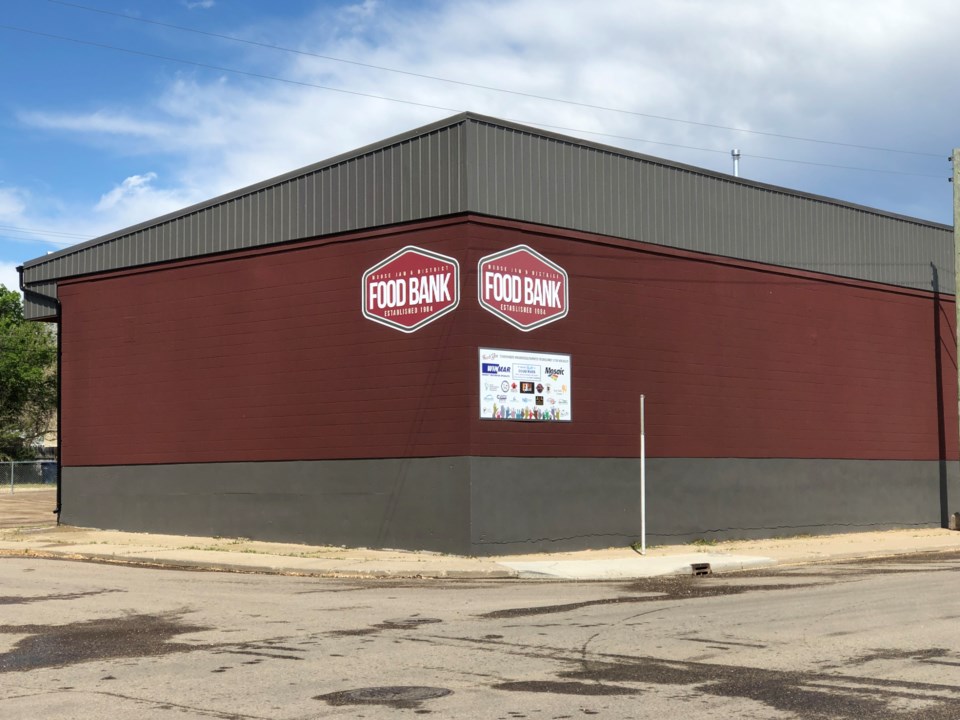The Moose Jaw & District Food Bank (MJFB) has seen record-high client number this year, including through the summer, although volunteer co-ordinator Deann Little said they’ve been able to keep up so far.
The MJFB launched a summer capital campaign to try and keep up with the soaring cost of food, which has also driven increasing numbers of low-income families to ask for their help. The goal of the summer campaign was to raise $100,000 to keep the shelves stocked — unfortunately, that goal was not reached.
“We did do a summer fundraiser to help support us and to be able to purchase food because of the cost rising,” Little said. “We didn’t do as well as we were hoping, but then again, every dollar has greatly helped us. We’re just appreciative, whether a person donates $5 or $1,000, everything adds up for us.”
The MJFB has also begun stocking a community fridge and pantry at High Park Towers. The resources help seniors living there who have mobility challenges and are struggling to afford food.
Cheantelle Fisher, the client resource representative at the MJFB, said the community pantry program is popular — they’re planning on expanding when they can.
“The need is still out there with the cost of everything having risen, and more people accessing our food bank,” Little said. “Anything of our surplus that we have goes in the community pantry. There’s a lot of seniors who have mobility issues. We’ve been trying to take food to some of the Moose Jaw Housing seniors’ complexes. … we just have to make sure the one we have is sustainable first.”
Fisher visited the Saskatchewan Legislature in May to ask for more help from the Ministry of Social Services. She told media at that time that most of the increased need the MJFB is seeing is driven by social services clients whose fixed income is not keeping up with inflation.
“I don’t think anything has changed,” she added. “And the situation is becoming more difficult, right? When we struggle to put food on our own tables, the first thing we have to cut is donating … and the food bank is really feeling that. It’s hard to see, hard to watch.”
Since March, Fisher has been running the Syn’gage program, and has helped about 65 clients in that time. The program is designed to keep people from needing the food bank in the first place by increasing their financial literacy skills.
“I absolutely have more room for clients,” Fisher said. “Folks can email me, phone, knock on the door, come upstairs to book an appointment. We do an intake session first … from there, we make an action plan together, we determine what the first steps are going to be.
"We usually assign some tasks to the client and some to me. … We try and keep it in small sections so it isn’t overwhelming.”
Fisher is developing online and in-person courses to teach skills such as budgeting, doing taxes, using bank accounts, avoiding predatory lenders — and a big section on scam and fraud awareness. She wants to offer the courses community-wide in the future.
“Lots of us have struggled,” she said. “I was not taught how to pay bills or budget. It’s scary, and takes a long time to figure out, with lots of frustration and mistakes. … And that struggle, it isn’t ‘character-building’. … We put ourselves in these holes with utilities or whatever it is, and then it feels impossible to get out of.”
Little credits the generosity of local businesses and individuals, the various food drives that take place, and the support of Food Banks Canada with keeping them afloat. The food bank volunteers, many of whom have been there for decades, are also essential.
“We’re anticipating a great year again, as far as people helping us, and food drives going on, and the different businesses and grocery stores that support us week after week,” Little added. “We couldn’t survive without their support. … And, of course, the volunteers are the lifeblood of this system, without them we couldn’t help anyone.”




